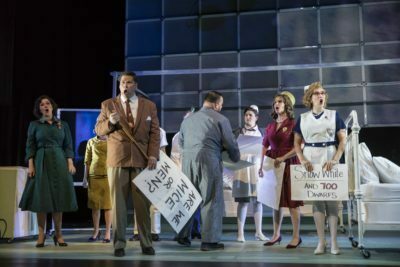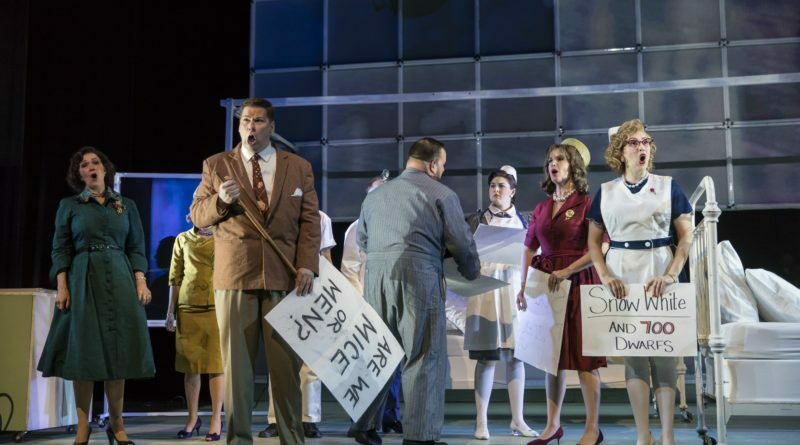The Perfect American
By Philip Glass
Based on the book by Peter Stephan Jungk
Libretto by Rudolph Wurlitzer
Directed by Kevin Newbury
Conducted by Andreas Mitisek
Produced Chicago Opera Theater
Playing at The Harris Theater, Chicago
A Poetic and Imaginative Glimpse Into Disney—the Man, the Myth, the Legacy
Philip Glass’s 2011 opera The Perfect American receives its Midwest debut this month—regrettably, with only one remaining showing—at the competent hands of the Chicago Opera Theater. Taking a darker look at the wizard of dreams, Glass envisions Walt Disney’s last three months battling lung cancer in a poetic fashion, with slips of consciousness into Disney’s defining past and a strange encounter with a late president—in the form of a life-size puppet. Imaginative and tragic, The Perfect American paints an entertaining sketch of one of the foremost icons of American culture.

Chicago Theater Opera’s production of The Perfect American takes place solely within the confines of a hospital, where Walt Disney (Justin Ryan) paces in a delirium, unable to tell reality from unreality. Glimpses into his past—from his time in hometown Marceline (“Where dreams come true . . . ”) to his halcyon days in Burbank—are projected on an enormous screen and acted within the setting of the clinical hospital room. The effect is a bit disorientating in terms of time and location but otherwise highly effective in placing us within the fragmented psyche of Walt Disney.
That said, the opera is less a story than a kind of gestalt of Disney’s psyche. The popular image of Disney as a whimsical man of imagination and dream-building is set against a more unsavory “reality” of Disney as a megalomaniacal racist god-head who wishes to build his themed utopias all over the globe and share credit with no one.
Glass, however, ultimately offers us a sympathetic perspective on Disney—and one not difficult to accept. Disney struggles with accepting his own death and preserving his legacy—a legacy we see (and to this day experience) grow larger than the man who inspired it. While he envisions his name growing as renown as Jesus and Muhammad, Disney laments how “Disney,” as the name of his brand, has usurped his individual identity. His remedy for death and obscurity is to be cryogenically frozen, so that he may yet survive and come back as a figure of hope to proclaim that even death is not an end to the dream.
As an opera novice, I find I have little to offer in terms of critique for the finer points of Chicago Opera Theater’s production of Glass’ The Perfect American. I myself found the instrumental harmonies more beautiful than the (for lack of more accurate word) “strained” melodies of the voices, though I imagine what I heard would sound normal to those accustomed to modern opera. The lyricism at times seemed sophomoric and odd; hearing people chant “apple pie” and “popcorn” and “choo-choo” and sing cumbersome phrases like “I saw the man push the button to the incinerator” sounded odd to me, but that might be because it is sung in English and that itself is foreign to my experience of opera.
Though the music is of the minimalist ilk, the staging was anything but. Most noteworthy was the use of projections and puppets. The projections fill the world of Disney’s psyche with a strong sense of nostalgia and support the pathos Glass develops for Disney. The puppet of late President Lincoln, designed by Sean Cawelti, works incredibly well on two levels: not only is it perfect inhabitant in the imagination of Disney, but it also adds to the overall subtly eerie tone of the opera. The Lincoln scene is easily the spectacle highlight of the opera.
My recommendation for Glass’s The Perfect American is to judge from one’s own experience. Fans of modern opera—Glass, in particular—I think will find it delightful. Those whose ears are not as amenable to the modern operatic sounds might consider the subject, as I myself, holding no interest in Walt Disney whatsoever, was nevertheless fascinated by it. This was only my second introduction to modern opera (the first being Chicago Opera Theater’s Invention of Morel—which I hated despite my fondness for the composer), and, insofar as it inspired a greater desire in me to search out more modern operas, I found The Perfect American redemptive of the broader “genre.”
Recommended
August Lysy
Playing at the Harris Theater, 205 E. Randolph St., Chicago. Tickets are $39 – $125. For tickets and information, call the 312-704-8414, or visit ChicagoOperaTheater.org. The one and only remaining performance is Sunday, April 30th at 3:00 p.m. Running time is 140 minutes with one intermission.

